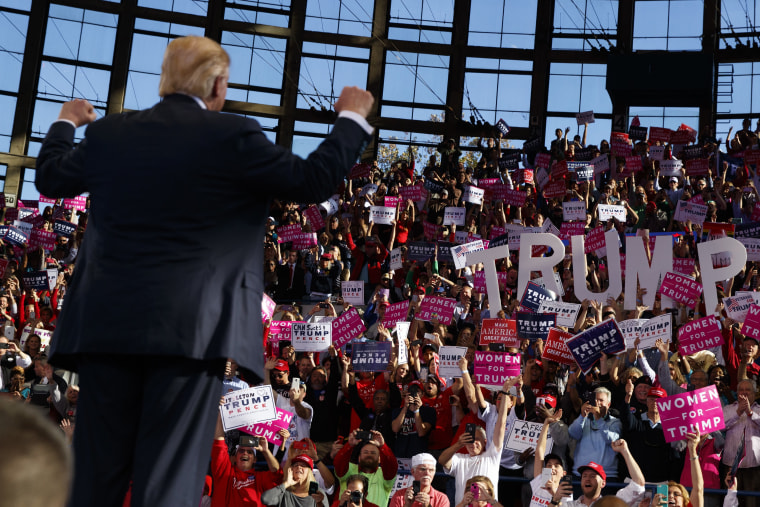More than a few political observers, hopeful that American politics was still driven by decency and principle, saw last week as a deal-breaker of sorts for Donald Trump. The amateur president could spend months testing the limits of the fabric that holds the country together, the argument went, but he couldn't expect to get away with offering a tacit defense of white supremacists.
And yet, here we are. The Washington Post reported yesterday:
A GOP strategist working campaigns in red and purple states said that while support for Trump generally declined slightly since Charlottesville, support rose among his base, after a decline last month because of the failure on health care and revelations about the Russia investigation. This strategist said many Trump supporters applaud the president's continuing desire to shake up Washington, favor his economic priorities and admire his willingness to speak his mind.
Hugh Hewitt, a conservative pundit who hosts an MSNBC weekend show, added on Twitter the other day that he spoke to a group of influential California Republicans, and he came away convinced that Trump's support "has increased" within the party in the wake of the president's racially inflammatory comments.
I wish this were more surprising, but it's important that the political world start adjusting its expectations for what constitutes "the Republican mainstream" in 2017. This radicalized GOP is Donald Trump's party, and with that comes a degree of comfort and acceptance with presidential antics many other Americans consider contemptible.
Indeed, this isn't exactly new. When Donald Trump launched his presidential campaign, it was generally seen as the punch-line to a ridiculous joke. He rode down an escalator, waving at people he paid to pretend to like him, since actual supporters didn't exist. Trump faced a massive field of Republican primary rivals who actually had qualifications, experience, and a basic familiarity with how government works.
When Rep. Keith Ellison (D-Minn.) said on a Sunday show in July 2015 that Trump could very well end up with the GOP nomination, others on set reacted as if the congressman had said something outlandishly foolish. The idea that Trump would seriously compete was quite literally laughable.
But Trump presented the GOP base with qualities no one else offered: nationalism, racism, and old-fashioned, unapologetic nativism. The party's voters, generally unconcerned with the size of government, swooned. The deeper Trump descended into the fever swamp -- attacking a judge of Mexican descent because he's Latino, calling for a ban on Muslims entering the country -- the stronger his hold on the nomination became.
So, yes, Trump praised the "very fine people" among the racist activists in Charlottesville, and faced an immediate backlash, but to assume that much of the Republican base was troubled by any of this is to lose sight of what made Trump appealing to those voters in the first place.
When the president fought to take away their health care benefits, the GOP base minded, When he fought with the media and blamed "both sides" for racist violence, these voters liked what they saw.
Indeed, there's quantifiable evidence to bolster the point: a CBS News poll last week found most Americans disapproved of Trump's response to Charlottesville, but by a four-to-one margin, Republicans said the opposite. The rest of the country and much of the world may have been repulsed, but GOP voters are watching events unfold through very different eyes.
